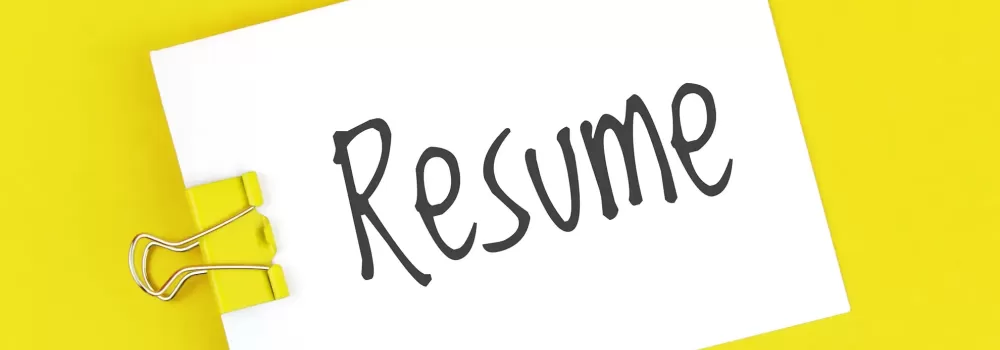Resume Tips for Fundraisers and Emerging Professionals
Posted Feb 11, 2021 by Ben Mohler

These resume tips for fundraisers are more than a how-to turn your work history into a fancy list of professional list of "humblebrags" Here are resume tips for fundraising professionals.
This week I had a lot of fun participating in a coaching call with the Association of Fundraising Professionals Texas A&M University Collegiate Chapter, including graduate students from The Bush School of Government & Public Service. We discussed resume tips for fundraisers. We were also able to dig a little deeper during individual one-on-one resume coaching sessions.
During these individual sessions we addressed items unique to emerging professionals. During the session I was able to share some of my resume tips for fundraisers and other positive practices for effectiveness. These resume tips and tools will make the experience of a job search less fearful.
Positive Practices for Resume Effectiveness
The resume is more than a fancy outline of work history and "humblebrags." It should communicate:
- Knowledge
- Skills
- Competencies
- Experience
- Excellence
In outlining the above, some examples will be very direct—like listing data-specific outcomes in past positions (think SMART goals). Other examples will be indirect—like showing attention to detail with careful proofreading or your ability to use Microsoft Word to format your resume. Whether direct or indirect, the details you communicate in the above areas should be presented in a way that differentiates you from other potential candidates. You should also strive to affirm alignment between your professional values and those of the organization you seek to join.
Approached in this way, your resume will; reduce uncertainty when the hiring committee selects finalists, establish your potential for success, and highlight your likely fit with the organizational culture, and ultimately mitigate risk for a final decision by the hiring manager.

Don't Try to the Hide Gaps.
Be upfront in any obvious gaps in knowledge, skills, competencies, and experience. Find opportunities for your employer to see where these gaps represent growth potential rather than a red flag that disqualifies your candidacy. A career coach can help you articulate your professional narrative and find the growth potential in these gaps. More accurately, gaps can be presented as where you are actively seeking your future employer to invest to help you find success in your new role.
Forego Fancy Formatting.
Focus on substance over style, at least in the beginning. Start with a plain text version of your resume. Add in style with formatting style templates. This approach helps make sure your resume is able to survive the gauntlet of the automated computer systems that parse resumes for keywords.
Mirror Your Resume to the Position.
Customize your resume to mirror the position job posting as much as possible. Reaffirm language and terms used in the organizational mission, vision, and values. Echo terminology used to described the knowledge, skills, and necessary competencies listed in the job posting.
Tips for a Less-Stress Search

Don’t Stop With the Resume.
Build a suite of supporting documents that you’ll likely need later on in the search process. You can’t possibly fit all your knowledge, skills, competencies, experiences, and excellence in one or two pages of a resume. For that reason, develop a more comprehensive curriculum vitae (CV) for use as a “resume library.” By having a CV as a reference point, you can keep a record of all your relevant professional attributes so you’re always ready to build a concise job-specific resume. Other documents that you should build and reference as you create more concise versions for a specific job application include a biography, cover letter template, list of references, list of notable projects or gifts closed, and a professional headshot.
Write Your Biography.
Similar to the use of a CV as a “master resume,” develop a “master biography” with multiple versions of your bio for different applications. Ideally, you should have a version formatted as one sentence, one paragraph, and a comprehensive version. This will give you something to start from when asked to provide a bio for a speaking engagement or when building a professional social media presence. Make sure your bio is proofread by a professional.
Cover Your Cover Letter.
Always include a cover letter. Don’t waste your cover letter retelling your resume in long-format prose. The cover letter is your opportunity to tell your story, give context, and to make a personal connection. Make sure to highlight any unique skills or experience that make you stand out. Be sure to bullet the most critical relevant skills as related to your experience. This is also your opportunity to help connect the dots if there are any shared connections that would bring credibility to your candidacy. With your cover letter, and any other document you formally submit as part of the job search process, make sure you keep a consistent letterhead format. This will typically be your name (as you’d like to be called and they’ll likely Google), your current phone number, and your current email address.
Check Your References.
Keep an active repository of all your references, their contact information, areas where they would be best able to represent you, also consider keeping in regular contact with them between job applications. Remember to be as thoughtful with your references as you are in crafting your resume. You will want to carefully curate your reference list to those that are best able to speak to the attributes sought by the employer. I also recommend these practices to give references a good experience and position them for success:
- Select references based on those that would be able to speak to the specific skills, knowledge, competencies, experience, or excellence relevant to the position
- Provide references with the job description or at least an overview of position as well as why you believe this position is a good fit
- Share a copy of your current resume and cover letter with your references
- Offer references a pre-reference check-in call prior to when they may get a call from the employer
- Keep your professional network warm and check in with your references between requests
Note Your Notable Projects and Gifts.
Develop a one-page list of your notable projects and another of your notable gifts (removing any details prohibited by confidentiality agreements). With some interviews use situational questions, having specific examples considered in advance will position you to perform well on these questions.
Sit for a Headshot.
Take time to get a well-composed and professional headshot image. This should be something that somebody takes for you, not a selfie. If resources permit, splurge and hire a professional. The time saved and the quality produced should be worth the investment. Use this image for any place the hiring manager is likely to discover your professional credentials.
Keep a File for Each Job.
Treat your career search like a job. Get organized on the front-end so you’re prepared when things start to take off. This is especially helpful if you are active in more than one search. This forethought will prepare you for when you secure the interview or make it into the final round. A repository of these items is also a valuable resource as you grow in your profession. Consider saving the following items for each position for which you apply:
- Include a copy of the custom, references, and cover letter you crafted especially for the position
- Include a copy of the job posting, your position research, leadership and personnel research, and organizational research
- Include a copy of the application you submitted (most application portals allow you to print a PDF version)
- Include any job negotiations and summary of findings, potential interview questions, and of course notes on the outcome
Turn to an Expert.
Members of the Association of Fundraising Professionals have several tools at their disposal. This handout on the value of an AFP membership for emerging fundraisers outlines many of these. Among the most helpful is AFP360° powered by Korn Ferry Advance. This tool allows AFP members to upload a resume and get meaningful feedback on the content and a preview of how a computer automated keyword system parses your resume.
